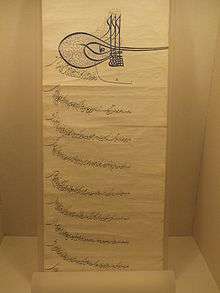Mülk
Etymology
Characteristics of mülk
Mülk was similar to freehold land; owners could buy, sell, and mortgage freely. It was exempt from some kinds of land taxes.[3] Mülk was about more than just the land; it might also include the right to annual malikane payments from tenants and farmers.[4]
Context
In much of the near east, mülk can be contrasted against miri, which was effectively state-controlled land (perhaps a former mülk forfeited to the state when the owner had no heir to pass it on to).[5]
In some ways, mülk was similar to vakuf property.
Related concepts
- çiftlik
- Iltizam
- Tapu resmi
- Sinirname
- Malikane
- Miri
- mawat: Dead land, or wilderness.
gollark: If so, mankind is doomed.
gollark: Oh no. Has Macron begun?!
gollark: Oh dear.
gollark: I don't know what you mean; is it Macron, LyricLy?
gollark: Oh hypermemetic ultrabees of cryoapiocity class 112-γ.
References
- Forni. "Land tenure policies in the Near East". FAO. Retrieved 28 October 2012.
- Türkische Wirtschafts- und Sozialgeschichte (1071-1920). p. 125. ISBN 9783447036832.
- "Mulk". Retrieved 28 October 2012.
- İslamoğlu-İnan (1994). State and Peasant in the Ottoman Empire: Agrarian Power Relations and Regional Economic Development in Ottoman Anatolia During the Sixteenth Century. p. 135. ISBN 9789004100282.
- "Ottoman Land Registration Law as a Contributing Factor in the Israeli-Arab Conflict". Archived from the original on 16 September 2008. Retrieved 28 October 2012.
This article is issued from Wikipedia. The text is licensed under Creative Commons - Attribution - Sharealike. Additional terms may apply for the media files.
